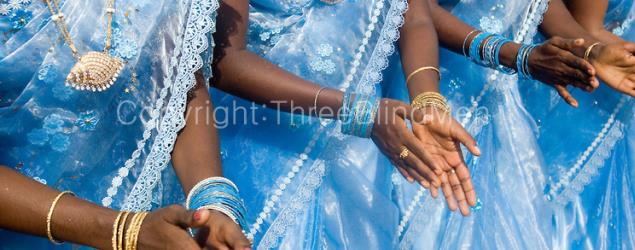Sri Lanka’s change of government was a miracle – now it needs another one.
The new president will have to work hard to reunite a divided country.
A wonderful thing has happened in Sri Lanka. Relegated to the inside pages by the Paris massacres, a kind of miracle took place last week: a sudden redemption. The superstitious, noting the proximity of this event to the arrival there of Pope Francis, who canonised the first-ever Lankan saint this Wednesday, might be tempted to credit the Holy Ghost.
A presidential election was held, local and international monitors followed the events closely, no serious outbreaks of violence were reported, the votes were properly counted, the incumbent lost by a substantial margin, and vacated the presidential palace, power was peacefully transferred. Everyone did what they were supposed to do, the loser as well as the winner. What’s miraculous about that?
The miracle is that the bullying power of Mahinda Rajapaksa, who had already rewritten the constitution to permit himself a third term in office, who had corrupted the judiciary, intimidated most of the media and who was gradually turning the country into his family’s fiefdom, was halted in his tracks – not by a popular uprising, a Sri Lankan so-called spring, but by the ballot box.
Practically since independence from Britain in 1948, Ceylon as it then was has been consumed in a crucial, disastrous debate: whose country is it anyway?
The Tamil minority, today some 15 per cent of the population, concentrated in the north and east but with a large presence in Colombo, too, had done well out of the colonial period, providing European rulers with reliable and well-educated functionaries. Independence meant payback time as the majority Buddhist Sinhalese steadily tilted the playing field in their own direction, in particular marginalising the Tamil language in favour of their own.
As a result, fear gripped both communities: Sinhala fear of a takeover by Tamils, backed by their far more numerous cousins and Hindu co-religionists in southern India, Tamil fear of being turned into a permanent underclass. Democracy, which was supposed to guarantee equality, perversely encouraged politicians in both communities to adopt truculently sectarian policies. Less than a quarter century into independence, the result was civil war.
This disastrous trajectory can be found in plenty of other post-colonial states. The usual result is some kind of dictatorship. Somehow or other Sri Lanka held onto the democratic forms throughout, despite the weeping sore of a civil war that dragged on for nearly 30 years. But behind the democratic façade the evils of civil conflict flourished: emasculation of public criticism, pervasive fear and suspicion, and the polarisation of the population into armed and hostile camps.
The war became a chronic condition. No leader seemed able to end it. The air was thick with rumours of the profits politicians were making from arms sales, encouraging them to let the conflict run and run. The outside world made matters worse by insisting that the only way ahead was peace talks between the elected Colombo government and the Tamil Tiger leader Velupillai Prabhakaran, despite the fact that the latter was directly responsible for the deaths of the Indian Prime Minister, Rajiv Gandhi, and the Sri Lankan President Ranasinghe Premadasa, as well as the attempted assassination of the Sri Lankan Prime Minister, Chandrika Kumaratunga. Perhaps it’s true that in the end talks with terrorists are unavoidable, but Prabhakaran’s attempts to re-invent himself, post-9/11, as a man of peace with whom the world could do business convinced very few. At his one and only press conference, in a clearing in the jungle in 2002, which I reported for i’s sister paper The Independent, he was obviously an unreformable killer.
The Rajapaksa offensive that ended the war in 2010 was brutal and merciless. But they were up against a brutal and merciless enemy: enemies always end up resembling each other. And all Sri Lanka’s communities were crying out for peace, however it might be achieved. Ending the war cut Mahinda Rajapaksa and his brothers a lot of slack.
A wiser man would have made very different use of the peace dividend. Instead of ramming home the fact that the Sinhala ascendancy was here to stay, and his family’s predominance with it, he would have used his popularity to start Sri Lanka’s democratic story afresh: inviting full Tamil participation instead of trading on the festering fears and suspicions of both communities. Thanks to the cunning of his former lieutenant, Maithripala Sirisena, who deserted him in November to stand against him in the presidential election, he will now have plenty of leisure to contemplate his mistakes.
Already the mood in the country has changed for the better. Journalists are once again writing what they actually think,
rather than what they think prudent. Rajapaksa has denied the “coup” rumour – the charge that he tried to get the army
to enable him to stay in power despite his imminent defeat. The new Foreign Minister says the transition of power was
“anything but” peaceful.
Mr Sirisena’s task now is to start Sri Lanka’s democratic history all over again from scratch, persuading the island’s feuding and estranged communities that they are all in the same boat,and that the playing of zero-sum games will take the nation straight back on the path to war. If he can match the cleverness he has demonstrated in the past two months with the sort of wisdom Mr Rajapaksa so sorely lacked, perhaps he will achieve another miracle.
Independent
